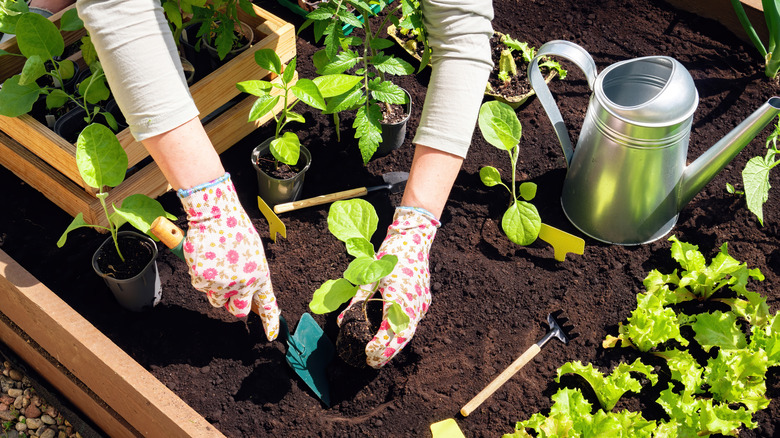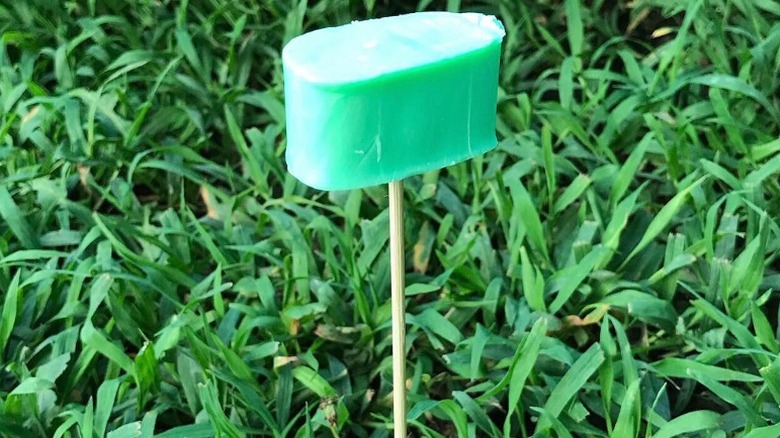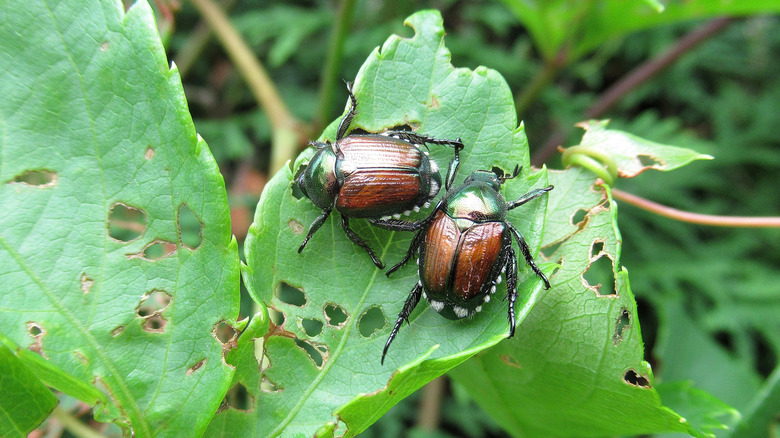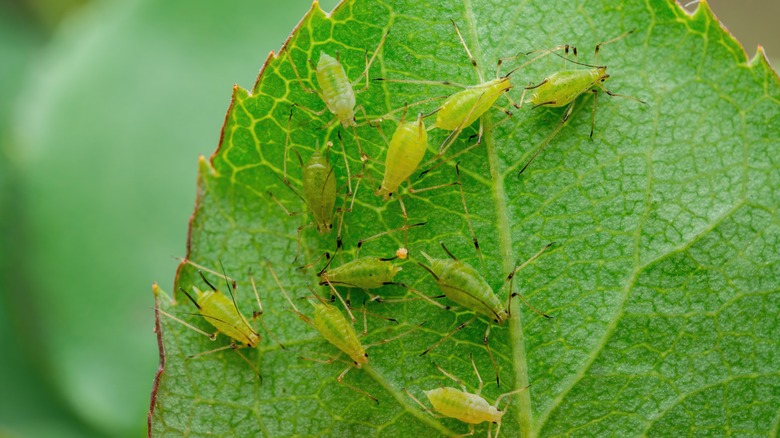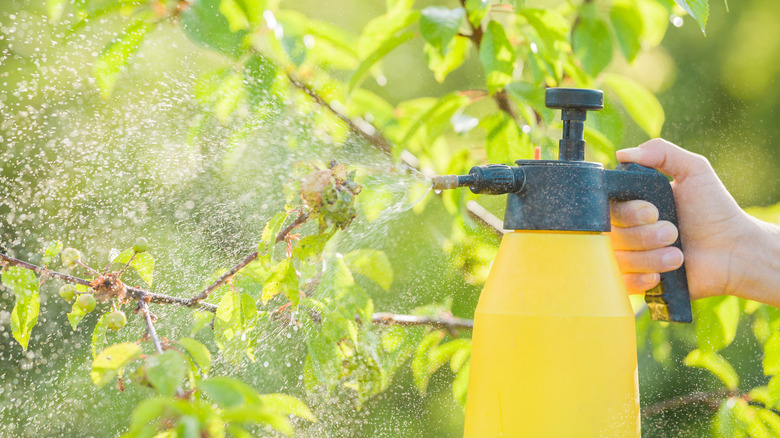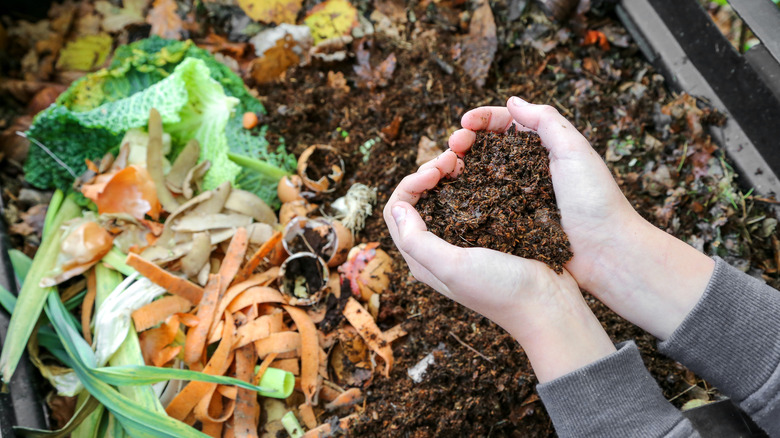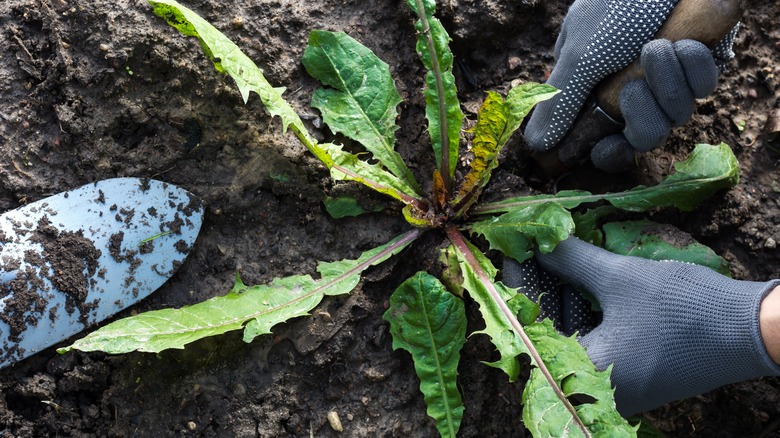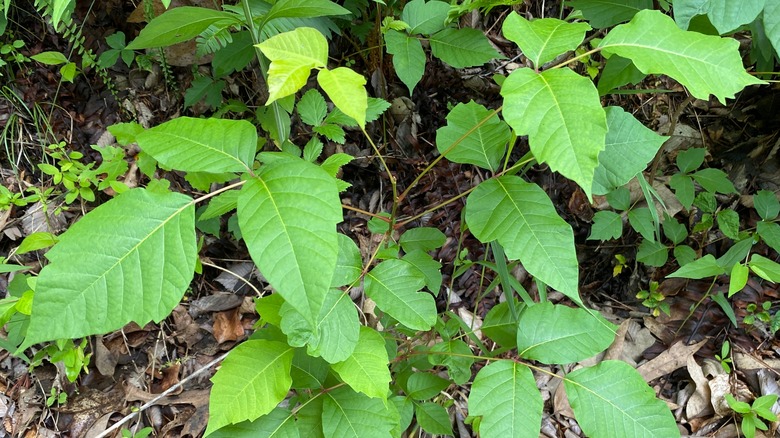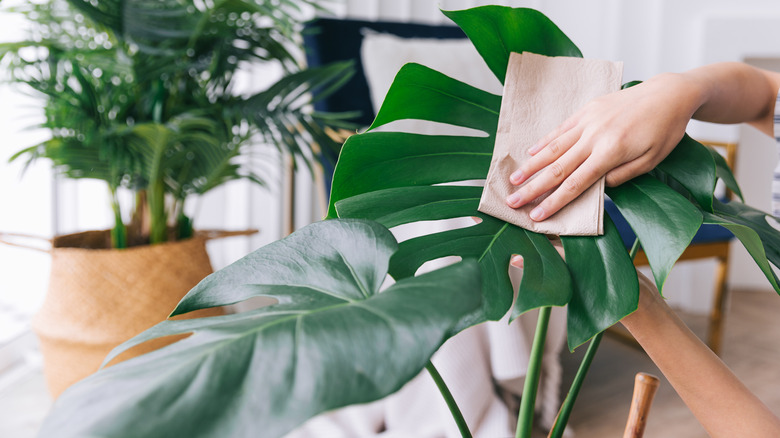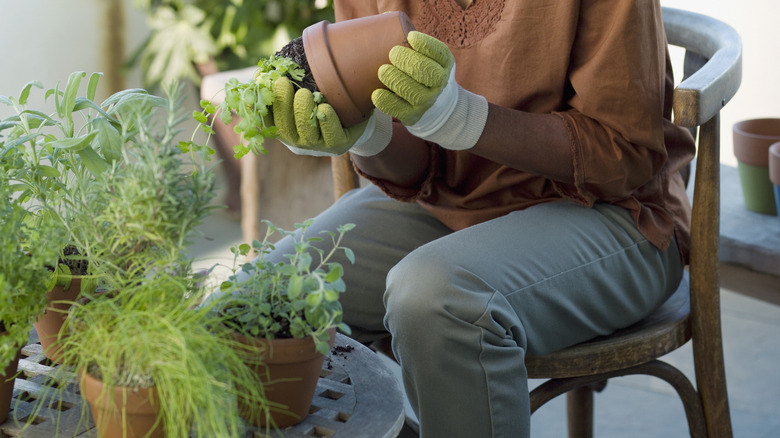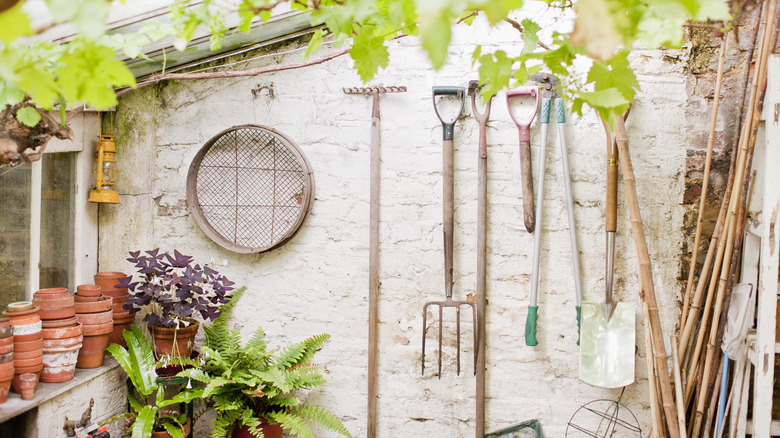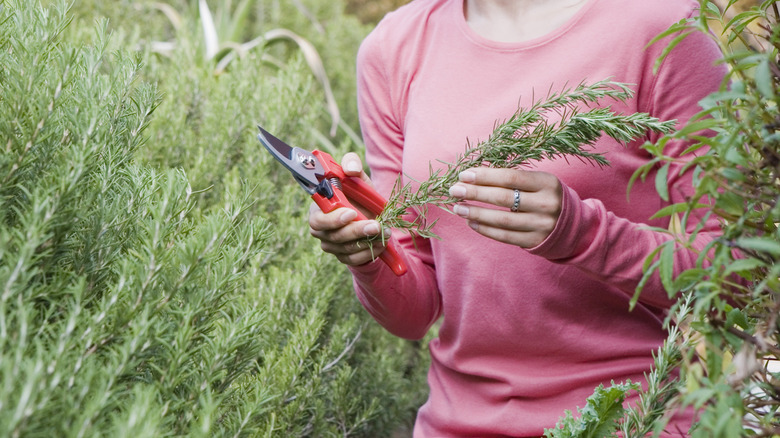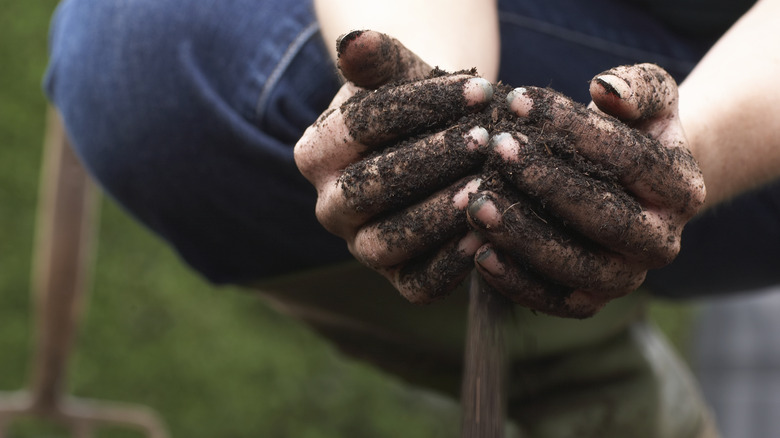12 Reasons You Should Put A Bar Of Soap In Your Garden
That bar of soap sequestered in your bathroom has more uses than washing hands and bodies. The places where you can use them are endless. There are plenty of recipes online that tell you how to melt down old soap to make new bars or create a liquid version. Plus, you can put bars in shoes to battle stinky feet, use them in clothing drawers and linen cupboards to keep fabrics smelling fresh and clean, and even use them to unstick zippers.
Those are all things you can do indoors, but you can also take them outdoors. Keep them with your gardening supplies in your tool shed because there are a ton of useful ways to use soap in your garden, from deterring pests to cleaning pots. It's not just for washing hands! They can be just as invaluable as your rake or spade. Whether it's a fresh bar of Dove or some leftover slices of Irish Spring, here are some wonderful uses for that soap in your garden.
1. Keep animals out of the garden
While watching the wildlife in your yard is fun, some critters are destructive to gardens, whether you're growing flowers or vegetables. If you want to deter rabbits, deer, and perhaps some other animals, a soap bar could be your answer.
Some animals have sensitive noses, and the smelly scent of a fresh bar of soap could be enough to keep them out of your plants. In this case, the more pungent soap, the better — so look for something like Irish Spring that is known for its potent scent. Opt for fresher soap, too: the longer it sits out, the more it loses that initial powerful aroma. If your bar's scent seems to be fading, cut it into chunks to release more fragrance. To use it to keep deer away, you'll want to hang the soap from your garden fencing, or you can spear it with sticks to "plant" in the garden itself — whatever is easier for you. While fencing may keep bunnies at bay (unless they dig under it), deer have a pretty high jump.
Are you worried about soap suds after a rainy day? You can help contain the mess in a mesh bag, but the key to avoiding a mess in the first place is to practice "less is more." Shave a few pieces into the dirt every couple of days rather than throwing full bars into the soil.
2. Keep bugs out of the garden
From garden to home, soap may help keep bugs away, including flies. If you have fruit flies bombarding your indoor garden, you can defeat them with a bar of Irish Spring. If the bugs keep finding their way into your outdoor garden, it'll help too.
You can simply leave a bar of soap by plants that are having the most issues with bugs, or if it's your home garden or greenhouse being attacked, you can use the soap to coat doors and windows and other places where the bugs are getting in. It's made to be gentle, so it shouldn't harm your home. If you rather not rub soap into the wood, you can also try hanging it from a piece of string.
Plus, having a bar of freshly scented soap around while you're gardening will also help keep the gnats and mosquitoes away from you too, not just your plants. Be sure to check the bar every once in a while, especially after it rains, so you can replace it once it has melted away.
3. Fight bugs already on your plants
If bugs are infesting your garden and you can't just pick them off, or they've laid eggs and you need to kill them at their source, you can use soap to safely remove them from your plants. Be sure to use bar soap, not dish soap. Dish soap is a detergent and can be harsh on sensitive plants. Bar soap is far gentler. All you have to do is lather up and gently rub that lather onto your plants' leaves and stems.
Not all bugs can be killed with soap. Only smaller bugs with soft bodies can be dried out to the point of death with this trick, which is why this works on aphids. It's also good when dealing with mites and whiteflies, but you won't have much luck battling those pesky Japanese beetles. However, you may be able to drown them in a bucket of soapy water. Pour the water into a spray bottle, and drench your plants with the solution.
4. Use it to make bug deterrent stick better
If you don't want to individually lather each infested leaf with soapy water, you can add bar soap to your insect repellent to fight off those nasty little bugs. While adding liquid hand soap to your spray gun may be easier, this is an excellent chance to finish off miscellaneous chunks of bar soap by melting them down and mixing them with your repellent. That way, you don't have to waste them.
Why do this? Soap is sticky, that's why. In this case, we're not using the soap to kill the bugs but mixing it with repellent or pesticide to make the agent stick better. This means you can kill a wider variety of pests than you would with a bar of soap alone. Plus, you don't need to add water in this case, so the mixture will be more potent in its application.
5. Add it to your compost
If you're serious about your garden, you probably have a composter or compost pile. To fight off those annoying insects that are drawn to the bin, add your leftover chunks of bar soap to your compost. It can also help fight off mildew. While there are plenty of biodegradable soap options out there, this is a great opportunity to use that sliver of soap that ends up left behind. It's too small to wash with, and no one wants to waste extra water to melt away that one little piece. This is where that compost bin comes in handy. In this case, don't toss brand-new bars in, just the leftover pieces.
However, ensure your soap has no synthetic dyes or fragrances, since that can compromise the pile. If you like using all-natural or sensitive-skin soaps, you're good to go. These small slivers should take about six months to break down, so ensure you don't replenish them more than twice a year.
6. Kills weeds
Pulling weeds is one of the most tedious things to do when keeping your garden neat and tidy. It's also a task you don't want to skip for too long, because those weeds can get out of control and choke out the plants you actually want to grow. Before using harsh chemicals in your vegetable garden, consider making your own weed killer using those leftover bits (or a chunk of a fresh bar) of bar soap.
While some recipes use dish soap, we recommend avoiding that harsher cleaning agent and using something milder in its place. This is where the bar soap comes in handy. You can melt your soap in a pan on low heat, stirring often, so it doesn't burn. A double boiler like those used in candle making is even better. Then mix your liquidized soap with some white vinegar in a spray bottle. You'll want about 1 ounce of soap to 1 gallon of vinegar. Spray directly on those pesky weeds, not the plants you want to keep, because it will dry them out. To get deep into the roots of the weeds, skip the spray and pour the mixture directly into the dirt.
7. Use it to combat contact with poisonous plants
While you're busy killing off the weeds in your garden, there's a chance you'll run into some peskier problems, like poison ivy. If you had a run-in with any poisonous plant that leaves behind painful skin rashes, you could combat the burning and itching with soap, which is one more great reason always to have some bars of soap hanging out with your gardening gear.
While some commercial products can help ease a tangle with poison ivy, getting some soap on it right away may help keep you from developing the itchy rash. That's because you'll remove the plant oil that causes it, nipping the problem in the bud. Rather than scrubbing, which could leave you with more pain, lather up your soap bar and lightly clean the area. Then, be sure to get under your fingernails and clean up any tools that came in contact with the culprit. Once you're indoors, clean your clothing and take a shower.
8. Clean up your plants
Just as indoor plants get dusty and need a bit of cleaning now and then, outdoor plants also get dirty and can sometimes benefit from a good washing. This is especially true with decorative, leafy plants in your flower beds or patio pots. Not only are clean plants healthier because they can absorb more nutrients when they're not covered in dirt, but regular cleaning will also leave them looking vibrant rather than dingy.
Rather than dousing your whole flower garden with a ton of water, you can gently clean off leaves with some suds from your lathered-up bar soap. Lather your hands, and spread the foam onto the leaves, both on top and underneath. Once sudsy, gently wipe the leaves with a damp towel, and let them either air dry or dry them with a clean microfiber cloth. Not only will this help your plants look vibrant, but it will also help control pest infestations.
9. Clean pots before reusing them
If your garden consists of any potted plants or if you have a porch container garden, you'll want your bar of soap on hand when it is time to do some repotting. When repotting plants, it may seem easier to dump out a dead plant and put a new one in its place without any sort of cleaning. After all, they're both plants and it's just dirt, right?
Cleaning pots is important because bugs can hang around in the traces of dirt left behind. The pot could also be mold-contaminated if your plant died from root rot. There's also a chance that, if you're using clay pots, the build-up of salt deposits can damage your plants by drying them out. Err on the side of caution and clean your pots with a bucket of water and some bar soap. You can use a regular sponge, or a microfiber cloth if you have delicate pots.
10. Clean up your tools
It's just as important to clean off your garden tools after each use. To not spread bugs or diseases from one plant to another, you want to clean and sterilize your instruments after working with them. Regularly sanitizing them will also help prevent them from becoming dull or rusty, ensuring they last longer.
Grab a bucket of water and that extra bar of soap to wash your tools, but you first want to wipe off any excess dirt. Once you're done cleaning your garden tools, dry them thoroughly to prevent rusting. It's also important to keep the handles of your tools cleaned and dried. With wood-handled tools, clean them with a damp cloth and bar soap rather than submerging them directly in the water, which can cause warping over time (and will likely lead to future splinters). It's also a good idea to rub them with mineral oil afterward to keep them from drying out.
11. It can lubricate your tools, too
Lubricating gardening tools, especially sheers, is just as important as keeping your tools clean. While oil is often suggested for lubrication(like the stuff that comes with your haircutting clippers), you can also use a bar of soap. That way, you don't have to waste money buying multiple cleaning products.
For this task, much like you'd do with a zipper that is stuck or not moving smoothly, rub the bar of soap along the blades of your cutting tools, including spades and hoes. The soap will leave a thin coating that won't rust since you're not using liquid or water. The next time you grab your sheers to trim your fruit trees or cut your rosemary, you'll produce a smooth cut. And since you're not using harsh chemicals, you don't have to worry about the safety of your herbs and veggies when it comes time to consume them.
12. Clean up your hands
Before you start cleaning your tools, you may want to wash your hands. Just one more reason a bar of soap is handy in the garden. You don't have to dirty your door and faucet handles just to wash your hands, which allows you to enjoy your harvest faster since you don't have a trail of dirt to clean. Instead, grab the garden hose and your bar of soap and wash up. No need to dirty your tools again while you're trying to clean them.
Some gardeners suggest putting dry soap underneath your nails before gardening to prevent dirt from getting into your nails. It blocks the soil from going inside and will dissolve once you wash your hands. All sorts of bacteria can hide under your nails, so why risk getting any of that gunk in your freshly cut and pulled veggies and herbs?
